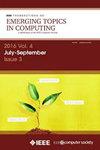基于四叉树的自适应空间分解,用于局部差分隐私下的范围查询
IF 5.1
2区 计算机科学
Q1 COMPUTER SCIENCE, INFORMATION SYSTEMS
IEEE Transactions on Emerging Topics in Computing
Pub Date : 2023-09-26
DOI:10.1109/TETC.2023.3317393
引用次数: 0
摘要
如今,基于地理位置的空间数据分析因其广泛的应用场景而备受研究人员关注。然而,利用均匀网格法划分数据空间的基于网格的四叉树范围查询(GT-R)算法,由于划分区域中引入了过多噪声,其准确性大打折扣。此外,私有自适应网格(PrivAG)算法没有采用任何索引结构,导致查询效率低下。为解决上述问题,本文提出了基于四叉树的自适应空间分解(ASDQT)算法。ASDQT 利用局部差分隐私(LDP)下的水库采样技术提取空间数据作为分割对象。通过设置合理的阈值,ASDQT 可动态构建树形结构,实现稀疏区域的粗粒度分割和密集区域的细粒度分割。在两个实际数据集上进行的广泛实验证明了 ASDQT 在处理具有不同分布的大规模空间数据集时的功效。结果表明,ASDQT 在准确性和运行效率方面都优于现有方法。本文章由计算机程序翻译,如有差异,请以英文原文为准。
Quadtree-Based Adaptive Spatial Decomposition for Range Queries Under Local Differential Privacy
Nowadays, researchers have shown significant interest in geographic location-based spatial data analysis due to its wide range of application scenarios. However, the accuracy of the grid-based quadtree range query (GT-R) algorithm, which utilizes the uniform grid method to divide the data space, is compromised by the excessive noise introduced in the divided area. In addition, the private adaptive grid (PrivAG) algorithm does not adopt any index structure, which leads to inefficient query. To address above issues, this paper presents the Quadtree-based Adaptive Spatial Decomposition (ASDQT) algorithm. ASDQT leverages reservoir sampling technology under local differential privacy (LDP) to extract spatial data as the segmentation object. By setting a reasonable threshold, ASDQT dynamically constructs the tree structure, enabling coarse-grained division of sparse regions and fine-grained division of dense regions. Extensive experiments conducted on two real-world datasets demonstrate the efficacy of ASDQT in handling large-scale spatial datasets with different distributions. The results indicate that ASDQT outperforms existing methods in terms of both accuracy and running efficiency.
求助全文
通过发布文献求助,成功后即可免费获取论文全文。
去求助
来源期刊

IEEE Transactions on Emerging Topics in Computing
Computer Science-Computer Science (miscellaneous)
CiteScore
12.10
自引率
5.10%
发文量
113
期刊介绍:
IEEE Transactions on Emerging Topics in Computing publishes papers on emerging aspects of computer science, computing technology, and computing applications not currently covered by other IEEE Computer Society Transactions. Some examples of emerging topics in computing include: IT for Green, Synthetic and organic computing structures and systems, Advanced analytics, Social/occupational computing, Location-based/client computer systems, Morphic computer design, Electronic game systems, & Health-care IT.
 求助内容:
求助内容: 应助结果提醒方式:
应助结果提醒方式:


